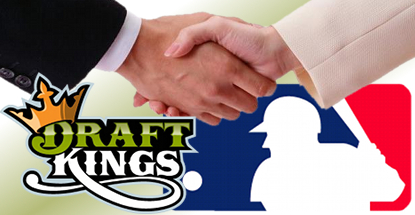 Daily fantasy sports (DFS) operator DraftKings has become the ‘official daily fantasy game’ of Major League Baseball (MLB).
Daily fantasy sports (DFS) operator DraftKings has become the ‘official daily fantasy game’ of Major League Baseball (MLB).
On Thursday, DraftKings announced a “multi-year expansion of its exclusive partnership” with MLB, which took an undisclosed equity stake in DraftKings two years ago. The announcement comes just days before Sunday’s commencement of the 2015 MLB season.
The partners’ new relationship will include co-branded MLB DFS games plus “unique games and fan experiences.” DraftKings will enjoy extensive promotion across MLB properties, including MLB.com, live sports streaming service MTL.TV, the MLB Network and the league’s official social media properties. DraftKings will also enjoy a highly visible presence at MLB ballparks and plans to partner with individual MLB franchises on “once-in-a-lifetime, market-specific in-ballpark experiences.”
DraftKings is already the official DFS provider for the National Hockey League. Rivals FanDuel have struck an exclusive deal with the National Basketball Association that allowed the NBA to take an undisclosed equity stake in FanDuel.
The National Football League has yet to pick a dance partner, presumably in order to (a) fend off even more accusations of hypocrisy over its virulently anti-betting stance, and (b) give it time to figure out how to eliminate the middleman and launch its own bespoke DFS product.
Along with online horse betting, fantasy sports received a carveout from the 2006 Unlawful Internet Gambling Enforcement Act (UIGEA), which restricted financial institutions from processing payments for other online gambling operators. With legal sports betting still a long ways off for anyone not living in Nevada, DFS has become the only legal option for US sports fans looking to add some spice to their games.
MLB instituted a new policy for this season, barring players from joining paid fantasy baseball leagues. Ryan Rodenberg, a sports law professor at Florida State University, told Bloomberg that while leagues are “embracing and monetizing” the DFS space, they were walking “a policy tightrope” by simultaneously “putting rules in place to bar league athletes, coaches and trainers from participating.”
MLB spokesman Pat Courtney said the policy was intended to keep “competition on the field and for on-field personnel to have no other outside influences on them with regard to the game.” A spokesman for the MLB Players Association said players retain the option of signing individual sponsorship deals or other tie-ins with DFS sites.
But Rodenberg suggested there was a disconnect between the leagues’ embrace of DFS and these player policies that are ostensibly intended to minimize potential game ‘integrity’ issues. If DFS is so harmless, Rodenberg wonders, “then why the ban?”
